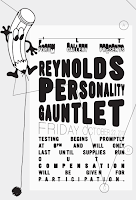Saturday, October 23, 2010
RPG
PROJECTED SELF IMAGE
Monday, September 6, 2010
Crafting a Moment
 |
| Party at Marcel Wanders' Studio. Photo courtesy of Kristina Gerig. |
Thursday, July 22, 2010
The Summer Slump
 |
| Tracy Singer and Laura Boyce sparkle away at the Cranbrook 4th of July party. Photograph by Erin Sweeny |
Friday, July 16, 2010
QUIT GRAD SCHOOL

Monday, July 12, 2010
pipilotti rist

Monday, June 28, 2010
Call for Conversations and Speakers.
Perhaps, a generalized argument could be made that contemporary artists are primarily concerned with the exploration of subjective realities and are compelled to present their findings objectively. It would follow, that the sciences and the humanities are concerned with the exploration of objective reality through logic and systematized knowledge. We want to know if these are incompatible opposites or complementary parallels. How would a group of disparate types of thinkers discuss aspects of contemporary culture important to all of them?
Cranbrook Academy of Art is a private art institution made up of 150 M.F.A. studio art candidates. The student body is looking to bring a wide range of world topics into their thoughts and art practice.
We are hosting 2-3 small discussion panels with the aim of connecting the student body to contemporary issues. Each participant will give a 10-15 min talk about their work followed by a group discussion. To give you an idea of what we’re interested in, here is a list of studies we are interested in. Whether it addresses an item on this list or not, we are open to your ideas.
Economics
Psychology
subjective vs. objective thought
PTSD or other Service related topics
environmental psychology
Sociology-
social networking
contemporary gender roles
Anthropology and Archeology
Politics
Environmental Studies
Email a short proposal including name and contact info and a topic you would like to speak about to rini2323@yahoo.com.






